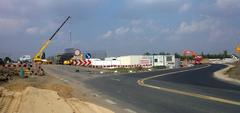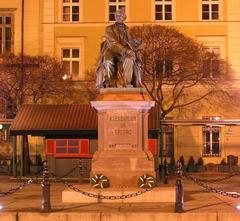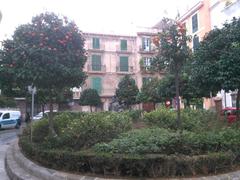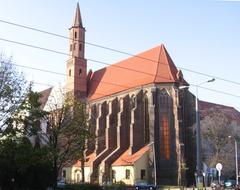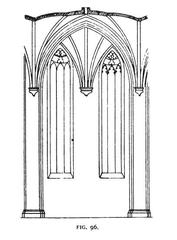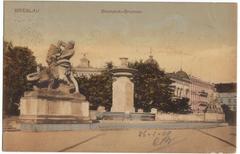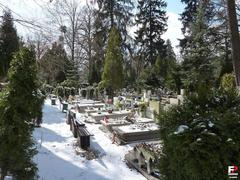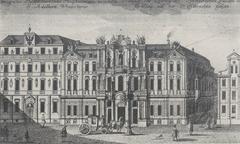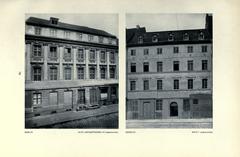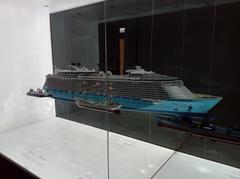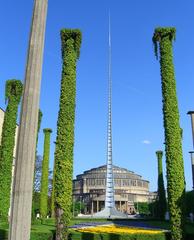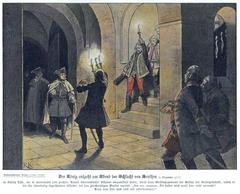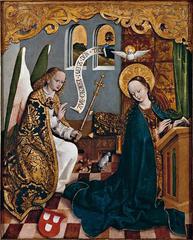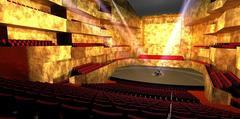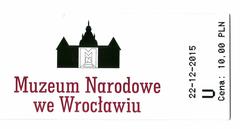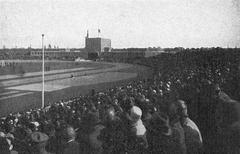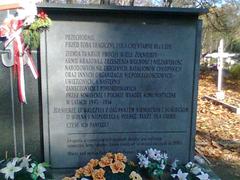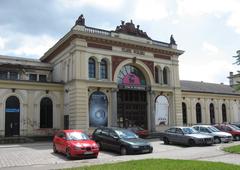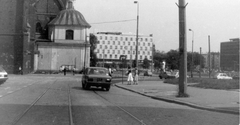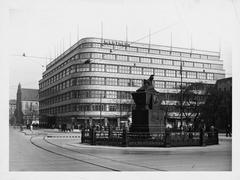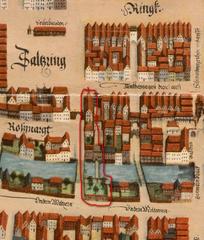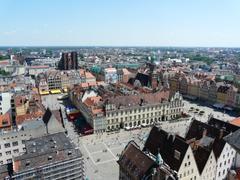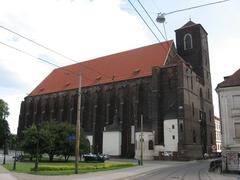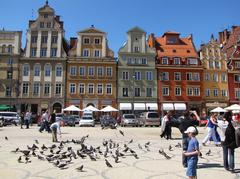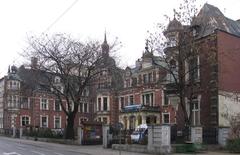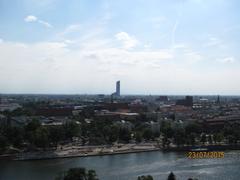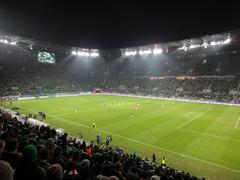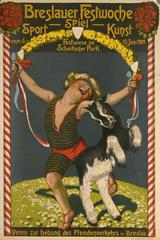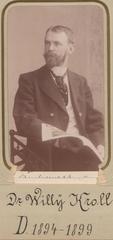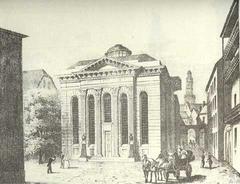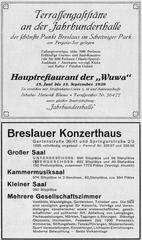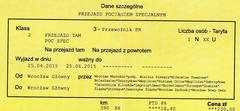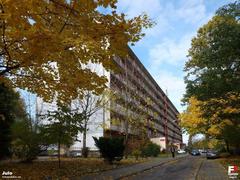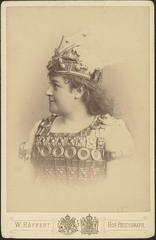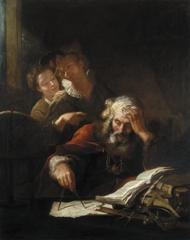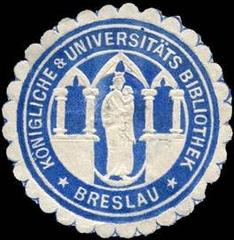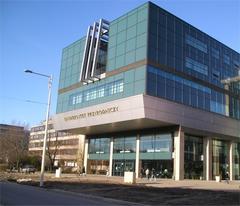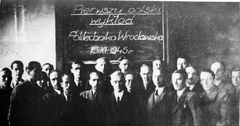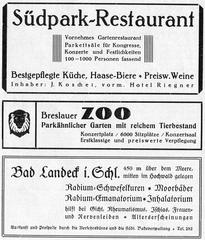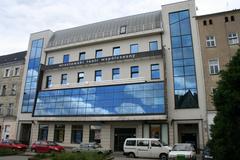
Wroclaw Feature Film Studio: Visiting Hours, Tickets, and Historical Significance in Wrocław, Poland
Date: 04/07/2025
Introduction
The Wroclaw Feature Film Studio (Wytwórnia Filmów Fabularnych we Wrocławiu, WFF Wrocław) stands as a cornerstone of Polish cinematic heritage and a dynamic center for contemporary film production. Founded in 1954 during Poland’s post-war decentralization of the arts, the studio has been instrumental in shaping both national and European cinema. Today, it serves as a vibrant hub for visitors—film enthusiasts, history lovers, and tourists—offering immersive tours, film-related events, and a unique insight into Poland’s artistic evolution. Whether you are exploring Wrocław’s cultural landscape or tracing the legacy of legendary directors, the Wroclaw Feature Film Studio is an essential destination. (WroclawGuide.com, Wroclaw Film Commission, WFF Wrocław Official Website)
Table of Contents
- Historical Background & Development
- Golden Era and Artistic Achievements
- Political Transformation and Studio Revival
- Contemporary Role and Facilities
- Visiting Information: Hours & Tickets
- Guided Tours & Visitor Experience
- Accessibility & Amenities
- Nearby Attractions
- Film Festivals & Community Engagement
- Visitor Tips & FAQs
- Conclusion & Resources
Historical Background & Development
Founded in 1954 in the revitalized city of Wrocław, the Wroclaw Feature Film Studio was part of a national strategy to diversify film production beyond Warsaw and Łódź. The studio was equipped with modern sound stages and technical facilities, quickly emerging as a creative epicenter for Polish cinema. In its early years, productions reflected the prevailing socialist realism, but soon evolved to embrace new artistic directions, particularly as Poland’s political and cultural climate shifted. (Wroclaw Film Commission)
Golden Era and Artistic Achievements
The 1950s–1970s marked WFF Wrocław’s golden era. The studio became a haven for directors of the influential Polish Film School movement, including Andrzej Wajda, Wojciech Jerzy Has, and Roman Polański. Iconic films such as The Saragossa Manuscript and Ashes and Diamonds were produced here, earning international acclaim and enhancing Poland’s reputation in global cinema. WFF also hosted collaborative projects and co-productions that further expanded its reach. (Wroclaw Film Commission, University of Wrocław)
Political Transformation and Studio Revival
The 1980s brought significant challenges due to martial law and censorship, but the studio continued to foster creativity, often subtly critiquing the political regime through film. The post-communist era introduced financial hurdles, yet also opened opportunities as the studio adapted to support independent and international projects. A renaissance began in the 21st century, with modernization of facilities and the integration of advanced film technologies, such as large-scale LED virtual production stages. (Screen Daily, Wroclaw.pl)
Contemporary Role and Facilities
The WFF Wrocław, now operating as part of the Audiovisual Technology Center (CeTA), boasts modern production halls (including a 1,200 m² and a 500 m² shooting stage), world-class sound and editing studios, set construction workshops, and state-of-the-art virtual production resources. The studio is a leader in innovation, supporting cutting-edge projects and attracting both local and global filmmakers. It also maintains extensive film archives and offers educational workshops in partnership with universities and film schools. (Audiovisual Technology Center, wffwroclaw.pl)
Visiting Information: Hours & Tickets
- Visiting Hours: Public tours are typically available on weekends and during special events, generally from 10:00 AM to 6:00 PM. Some guided tours and exhibitions may operate on select weekdays. Always check the official website for the latest schedule.
- Tickets: Tickets can be purchased online or at the studio entrance. Pricing varies based on tour type and event; discounts are often available for students, seniors, and groups. Some guided tours are free but require advance booking. (Wroclaw Feature Film Studio Tickets)
- Booking: Reservations are highly recommended, especially during festivals or for group visits.
Guided Tours & Visitor Experience
Guided tours offer exclusive access to the studio’s historic sound stages, technical spaces, and archives. Visitors can explore:
- Iconic film sets and props from Polish cinema classics
- Interactive exhibits on film editing, sound design, and set construction
- Special screenings and Q&A sessions during festivals and events
Tours are conducted in Polish and English; other languages may be available upon request with advance notice. Photography is permitted in public areas and exhibitions, subject to restrictions on active film sets. (Wroclaw Film Commission, visitwroclaw.eu)
Accessibility & Amenities
The studio is fully accessible, with ramps, elevators, and adapted restrooms to accommodate visitors with disabilities. Additional amenities include:
- Multilingual reception/information desk
- Café and lounge areas for refreshments
- Gift shop offering film-themed souvenirs
- Cloakroom and restrooms
Staff are available to assist visitors with special needs—advance notification is recommended for tailored support.
Nearby Attractions
The studio’s location in the Krzyki district makes it an ideal starting point to explore Wrocław’s cultural highlights, such as:
- Centennial Hall (UNESCO World Heritage Site)
- Japanese Garden & Szczytnicki Park
- Wrocław Market Square (Rynek)
- Ostrów Tumski (Cathedral Island) Further suggestions can be found at Things to Do in Wroclaw.
Film Festivals & Community Engagement
WFF Wrocław is a key venue for major film festivals, including the New Horizons International Film Festival and the American Film Festival. The studio regularly hosts workshops, lectures, and community events that foster public engagement and promote Poland’s cinematic achievements. (New Horizons Film Festival, Screen Daily)
Visitor Tips & FAQs
Q: What are the best times to visit?
A: Weekdays and early afternoons are less crowded; festival periods offer unique experiences but can be busy.
Q: How do I book tickets?
A: Book online via the official website or at the entrance. Advance booking is advised, especially for tours and workshops.
Q: Are discounts available?
A: Yes, for students, seniors, families, and groups.
Q: Is the studio accessible for visitors with disabilities?
A: Yes, with full facilities and staff assistance available.
Q: Can I take photographs?
A: Allowed in public exhibition areas; some restrictions apply during filming or on active sets.
Q: Are tours offered in languages other than Polish and English?
A: Other languages may be available upon advance request.
Conclusion
The Wroclaw Feature Film Studio is a living monument to the resilience, creativity, and ongoing innovation of Polish cinema. From its historic roots to its modern role in film production, the studio offers a multifaceted experience for visitors—combining engaging guided tours, state-of-the-art facilities, and a rich calendar of cultural events. Its strategic location, accessibility, and integration with Wrocław’s vibrant arts scene make it a top cultural attraction in Poland.
Plan your visit by checking the latest schedules, booking your tour in advance, and exploring nearby attractions to make the most of your time in this cinematic landmark.
For up-to-date visiting hours, ticket information, and event schedules, refer to the following official sources:
- WroclawGuide.com
- Wroclaw Film Commission
- WFF Wrocław Official Website
- Travel2Next – Things to Do in Wroclaw
- Screen Daily
- University of Wrocław
- Wroclaw.pl
- Audiovisual Technology Center (CeTA)
- Travel-Buddies: Wroclaw Private Tours
- Wroclaw Feature Film Studio Tickets
For a richer experience, download the Audiala app for personalized travel guides, and follow Wroclaw’s film and cultural scene on social media for the latest updates and tips!

